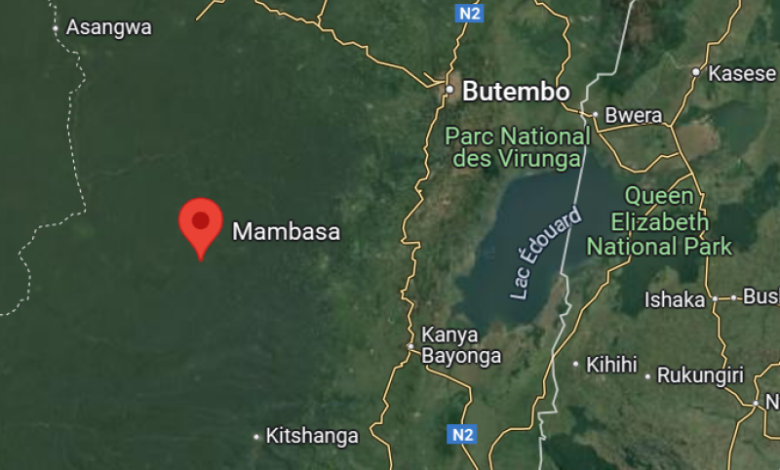After Goma, Rwanda-Backed Rebels Regrouping to Capture Other Towns in DR Congo
The redeployment of the rebels is causing panic among the populations who fear the imminent intensification of hostilities on this front, which has been silent for some weeks now.

The Rwanda-backed M23 rebels have redeployed soldiers to Lubero following the capture of North Kivu, the provincial capital of Goma in the Democratic Republic of Congo (DR Congo).
Locals in the Kirumba area of South Lubero, said columns of vehicles carrying M23 fighters have crossed through Kirumba on their way to Alimbongo, which is now the frontline in Lubero, since Saturday morning.
The redeployment of the rebels is causing panic among the populations who fear the imminent intensification of hostilities on this front which has been silent for some weeks now.
Locals told HumAngle that following the intensification of fighting in Masisi and Nyiragongo, leading to the capture of Goma, the Lubero front witnessed sporadic shooting and rebel advances.
In Lubero, for instance, the DR Congo army has recaptured Mambasa, the chief town of the Bamate chiefdom, which had been under M23 control. The rebels have now withdrawn to Nduta, a village situated near Alimbongo.
When the rebels marched towards Butembo, their progress was made difficult because they had no support from the locals. They also failed to get the support of local notables such as Mbusa Nyamwisi, Juien Paluku, Nzangi Muhindo, and Mbindule Mitono. Meanwhile, the economic operators in the zone are angered that their goods were looted in Goma by the M23.
Since the entry of the M23 rebels in the Lubero territory, Butembo has organised two demonstrations on foot against them, the first one being for 19 kilometres right up to Musienene and the second one for 45 kilometres to Lubero Centre, to mark their support for the army and to explicitly oppose the arrival of the rebels in the zone.
Unlike Goma, Masisi, and Rutshuru, where some Rwandophones reside, the Lubero, Butembo, and Beni regions have a predominantly Nande population. The Nande community has historically been wary of Rwandan expansionism, and as a result, many residents in these areas believe that an existential war is looming.
The recent influx of Rwanda-backed rebels into this region has raised concerns about the potential for increased violence and instability. This development has drawn parallels with the early 2000s, when militia groups would frequently launch hit-and-run attacks on Ugandan army positions, prompting reprisal attacks that put civilians in harm’s way.
The presence of Rwanda-backed rebels in the area exposes the local population to a heightened risk of violence, displacement, and human rights abuses. The Nande community’s historical suspicions of Rwandan intentions, combined with the current security situation, have created an atmosphere of tension and fear in Lubero, Butembo, and Beni.
The Greater North remains a strategic block against the advance of the M23 which shows no signs of halting their progress on the ground, according to the Rwandan diplomat Vincent Karega. The diplomat added that this strategic block could prevent the M23 from reaching Tshopo and Ueles, the fief of origin of Corneille Naanga the leader of the Congo River Alliance which includes the M23. This strategic obstacle can also prevent the M23 fighters from reaching Ituri where the M23 already has a heavyweight ally in the person of Thomas Lubanga as cited in a report by United Nations experts.
Should the rebels succeed in arriving at these zones, – Tshopo, Uels and Ituri – they can easily mobilise the populations, knowing they are the fiefs of Naanga and Lubanga on the one hand, or force a split in local opinion, especially in Ituri by pitching the Lendu against the Hema, whom they claim they want to save from the Lendu militia of the Cooperative for the Development of Congo (CODECO).
To ensure the support of these communities in the battle for the preservation of the strategic block which is the Greater North, and to have the notables of the region on his side, President Felix Tshisekedi last week appointed a son of the local community in the person of Major-General Evariste Kakule Somo to succeed the late Governor Peter Cirimwami as governor of North Kivu.
Rwanda-backed M23 rebels have redeployed to Lubero after capturing Goma in DR Congo, causing panic among locals who fear intensified hostilities.
Rebel movements have triggered sporadic fighting in areas like Masisi and Nyiragongo, with the DR Congo army recently retaking Mambasa from M23.
The local Nande population, historically wary of Rwandan expansionism, has organized protests against these rebels, raising tensions.
The strategic Greater North region is seen as a critical defense line against M23's advance, with DR Congo's President Tshisekedi appointing Major-General Evariste Kakule Somo as North Kivu's governor to consolidate local support and stabilize the area.
This situation has raised concerns about potential violence, displacement, and human rights abuses, drawing comparisons to conflicts from the early 2000s.
Support Our Journalism
There are millions of ordinary people affected by conflict in Africa whose stories are missing in the mainstream media. HumAngle is determined to tell those challenging and under-reported stories, hoping that the people impacted by these conflicts will find the safety and security they deserve.
To ensure that we continue to provide public service coverage, we have a small favour to ask you. We want you to be part of our journalistic endeavour by contributing a token to us.
Your donation will further promote a robust, free, and independent media.
Donate HereStay Closer To The Stories That Matter




